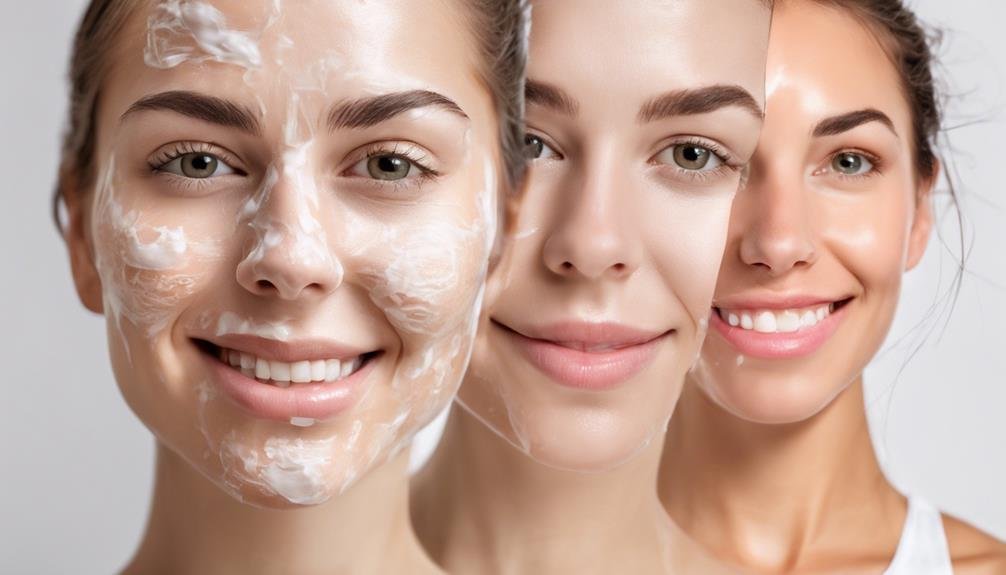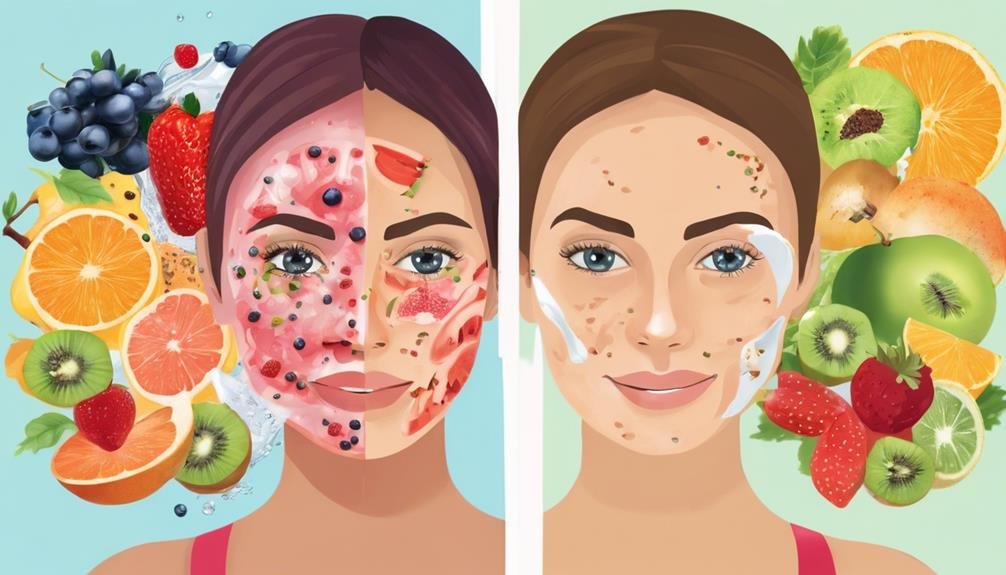"Cherishing Little Steps - A Haven for Baby and Family Journeys"
Fight Acne With a Healthy Lifestyle
To combat acne effectively, you must understand that a healthy lifestyle goes beyond just surface-level treatments. By focusing on your diet, hydration, exercise, stress management, skincare routine, and other holistic approaches, you can address acne from multiple angles. The key lies in making sustainable lifestyle changes that support your skin's health and overall well-being. These interconnected factors play a crucial role in achieving clear, radiant skin. So, are you ready to take charge of your skin health and unlock the secrets to combating acne naturally and effectively?
Key Takeaways
- Consume antioxidant-rich foods for skin health.
- Stay hydrated to flush out toxins and maintain skin elasticity.
- Engage in regular exercise to promote circulation and reduce stress.
- Manage stress through relaxation techniques and mindfulness.
- Follow a skincare routine with gentle products and sun protection.
Importance of a Balanced Diet

To effectively combat acne and promote clear skin, one of the key pillars lies in maintaining a balanced diet. Consuming foods rich in antioxidants, vitamins, and minerals can help your skin stay healthy and reduce the likelihood of acne breakouts. Research suggests that certain nutrients play a crucial role in skin health.
For example, vitamin E helps protect skin cells from damage and supports overall skin health. Omega-3 fatty acids, found in foods like salmon and walnuts, can help reduce inflammation in the body, which may benefit acne-prone skin.
Additionally, incorporating plenty of fruits and vegetables into your diet provides essential vitamins and minerals that support skin health. Foods high in antioxidants, such as berries and leafy greens, can help combat oxidative stress and promote clear skin.
Hydration for Clear Skin
Maintaining adequate hydration is essential for achieving clear and healthy skin. Water plays a crucial role in flushing out toxins from your body, including those that can contribute to acne. When you're dehydrated, your skin can become dry, leading to increased oil production as a way to compensate. This excess oil can then clog your pores and result in breakouts. To combat this, aim to drink at least 8-10 glasses of water daily to keep your skin hydrated and promote overall skin health.
Additionally, staying hydrated helps maintain the elasticity of your skin, reducing the likelihood of developing fine lines and wrinkles. Proper hydration also supports the skin's natural regeneration process, aiding in the repair of damaged skin cells and promoting a clearer complexion.
Incorporating hydrating foods such as fruits, vegetables, and herbal teas can also contribute to your overall hydration levels. Remember, the key to clear skin starts from within, so prioritize your hydration to achieve that radiant, acne-free complexion.
Exercise and Acne Reduction

During physical activity, your body undergoes numerous beneficial changes that can positively impact your skin, including the potential reduction of acne. Exercise promotes healthy circulation, delivering oxygen and nutrients to your skin cells while carrying away waste products. Sweating during exercise helps to clear out your pores, reducing the likelihood of acne breakouts.
Additionally, physical activity triggers the release of endorphins, which can help lower stress levels. Stress is known to contribute to acne flare-ups, so by managing stress through exercise, you may see an improvement in your skin's condition.
Engaging in regular exercise also boosts your immune system, which can aid in fighting off acne-causing bacteria. Furthermore, physical activity helps to regulate hormone levels, which play a significant role in acne development. Remember to cleanse your skin post-workout to remove sweat and bacteria that may have accumulated during exercise.
Incorporating a mix of cardiovascular exercises, strength training, and flexibility workouts into your routine can contribute to overall skin health and acne reduction.
Stress Management Techniques
Stress can significantly impact your skin health, potentially exacerbating acne breakouts. Managing stress is crucial for maintaining clear skin. Implementing stress management techniques can help reduce the negative effects of stress on your skin. Here are some effective strategies to incorporate into your daily routine:
| Stress Management Techniques | Description |
|---|---|
| Deep Breathing | Inhale deeply through your nose, hold for a few seconds, then exhale slowly through your mouth. Repeat several times. |
| Mindfulness Meditation | Focus on the present moment, acknowledge your thoughts without judgment, and let them pass. |
| Exercise | Engage in physical activity to release endorphins, which can help reduce stress levels. |
| Relaxation Techniques | Practice yoga, progressive muscle relaxation, or take a warm bath to unwind and alleviate stress. |
Incorporating these stress management techniques into your daily routine can help you better cope with stress, ultimately benefiting your skin health and reducing the likelihood of acne breakouts.
Skincare Routine for Acne

Addressing acne through a tailored skincare routine is essential for promoting clear and healthy skin. To effectively manage acne, start with a gentle cleanser to remove dirt and excess oil without stripping your skin. Look for products containing salicylic acid or benzoyl peroxide, known for their acne-fighting properties.
After cleansing, apply a lightweight, oil-free moisturizer to keep your skin hydrated without clogging pores. Incorporating a treatment containing ingredients like retinol or niacinamide can help target acne and prevent future breakouts. Remember to use sunscreen daily to protect your skin from UV damage and prevent post-inflammatory hyperpigmentation.
Avoid harsh scrubs or over-exfoliation, as these can irritate the skin and worsen acne. Consistency is key, so stick to your routine and give it time to show results. Consulting a dermatologist can also provide personalized recommendations for managing acne effectively. By following a dedicated skincare routine tailored to your skin type, you can help combat acne and achieve a clearer complexion.
Sleep Quality and Skin Health
For optimal skin health, paying attention to your sleep quality is crucial. Quality sleep allows your skin to repair and regenerate, contributing to a clear and radiant complexion. When you don't get enough sleep, your body produces more of the stress hormone cortisol, which can lead to inflammation and breakouts. Additionally, lack of sleep can disrupt your skin's moisture balance, making it appear dull and dehydrated.
Research shows that individuals who consistently get 7-9 hours of quality sleep each night tend to have healthier skin with fewer signs of aging. During deep sleep, our body boosts blood flow to the skin, promoting a healthy glow and allowing for better absorption of skincare products.
To improve your sleep quality, establish a relaxing bedtime routine, avoid caffeine and electronics before bed, and create a comfortable sleep environment. Prioritizing good sleep hygiene not only benefits your overall health but also plays a significant role in achieving clear and luminous skin.
Impact of Sugar on Acne

Excessive sugar consumption has been linked to the development and exacerbation of acne. When you consume high amounts of sugar, it can lead to increased inflammation in the body, triggering acne breakouts. Additionally, sugary foods can elevate insulin levels, which in turn may boost sebum production, clogging pores and causing acne.
Here is a breakdown of how sugar can impact acne:
| Impact of Sugar on Acne | |
|---|---|
| Increased Inflammation | Sugary foods can lead to heightened inflammation, worsening acne symptoms. |
| Elevated Insulin Levels | High sugar intake can spike insulin levels, potentially increasing sebum production and pore blockages. |
| Skin Aging Effects | Sugar can accelerate skin aging, leading to a dull complexion and potentially worsening acne scarring. |
Benefits of Antioxidants
With the impact of sugar on acne established, it's crucial to turn our focus to the benefits of antioxidants in maintaining clear and healthy skin.
Antioxidants are powerful compounds that help combat oxidative stress in the body, which can contribute to acne development. They work by neutralizing free radicals, unstable molecules that can damage skin cells and lead to inflammation.
By incorporating antioxidant-rich foods like berries, green tea, nuts, and colorful fruits and vegetables into your diet, you can help protect your skin from harmful environmental factors and promote a healthy complexion.
Research suggests that antioxidants play a significant role in reducing inflammation, regulating sebum production, and promoting skin repair and renewal. Vitamins C and E, selenium, and beta-carotene are some of the key antioxidants known for their skin benefits.
Including these nutrients in your daily meals or through supplements can help support your skin's overall health and combat acne from within. By embracing a diet rich in antioxidants, you can take proactive steps towards achieving clearer and more radiant skin.
Role of Probiotics in Skin

Within the realm of skincare, the role of probiotics in maintaining skin health has garnered increasing attention due to their potential impact on acne and overall skin condition. Probiotics are live bacteria and yeasts that are beneficial for your digestive system, and emerging research suggests they may also play a crucial role in skin health. By promoting a healthy balance of good bacteria in your gut, probiotics can help reduce inflammation and strengthen the skin's natural barrier, potentially leading to fewer breakouts and improved skin texture.
Studies have shown that probiotics can help decrease sebum production, which is a key factor in the development of acne. Additionally, they may help regulate the skin's pH levels, creating an environment less conducive to acne-causing bacteria. Incorporating probiotics into your skincare routine or diet through supplements, fermented foods like yogurt and kimchi, or topical products may help support a clearer, healthier complexion. Remember to consult with a dermatologist or healthcare provider before making any significant changes to your skincare regimen.
Sun Protection for Acne
To effectively manage acne and maintain healthy skin, ensuring proper sun protection is crucial. Sun exposure can trigger inflammation and worsen acne, making it essential to protect your skin from harmful UV rays. Here are some important tips to shield your skin from the sun while dealing with acne:
- Apply a Broad-Spectrum Sunscreen: Opt for a non-comedogenic sunscreen with at least SPF 30 to protect your skin without clogging pores.
- Seek Shade During Peak Hours: Stay in the shade between 10 a.m. and 4 p.m. when the sun's rays are strongest to reduce the risk of skin damage.
- Wear Protective Clothing: Utilize clothing, hats, and sunglasses to provide additional coverage and shield your skin from direct sunlight.
Hormonal Balance and Acne

Maintaining hormonal balance is a key factor in understanding and effectively managing acne. Hormones play a significant role in the development of acne, particularly during puberty, menstruation, pregnancy, and menopause. Fluctuations in hormone levels can lead to an increase in sebum production, which can clog pores and result in acne breakouts.
One hormone that plays a crucial role in acne development is androgens, such as testosterone. Androgens stimulate the sebaceous glands to produce more oil, which can contribute to the formation of acne lesions. Additionally, hormonal imbalances involving insulin-like growth factor 1 (IGF-1), cortisol, and estrogen can also impact acne severity.
To help maintain hormonal balance and manage acne, focus on adopting a healthy lifestyle. This includes getting regular exercise, managing stress levels, eating a balanced diet rich in fruits and vegetables, staying hydrated, and getting an adequate amount of sleep. Consulting with a healthcare provider or dermatologist can also provide valuable insights and treatment options for hormonal acne.
Supplements for Skin Clarity
Balancing your hormones is a critical aspect of managing acne, but sometimes your skin needs an extra boost to achieve clarity. When it comes to supplements for skin health, there are a few key options to consider:
- Zinc: Known for its anti-inflammatory properties, zinc can help reduce acne-causing inflammation and regulate oil production in the skin.
- Omega-3 Fatty Acids: These essential fats help maintain skin hydration and elasticity, reducing the likelihood of clogged pores and breakouts.
- Probiotics: Supporting gut health can have a positive impact on skin clarity by balancing the microbiome and reducing inflammation.
Incorporating these supplements into your routine, alongside a healthy diet and proper skincare, can further enhance your efforts to achieve clearer skin. Remember to consult with a healthcare provider before starting any new supplement regimen to ensure they're appropriate for your individual needs.
Frequently Asked Questions
Can Wearing Makeup Cause Acne Breakouts?
Yes, makeup can cause acne breakouts. Certain ingredients in makeup products can clog pores, leading to breakouts. Opt for non-comedogenic and oil-free options. Remember to cleanse your face thoroughly before bed to prevent buildup and breakouts.
How Often Should I Change My Pillowcase to Prevent Acne?
To prevent acne, change your pillowcase at least once a week. Oils, dirt, and bacteria accumulate on fabric, leading to breakouts. Fresh pillowcases reduce skin irritation and promote clearer skin. Embrace this simple habit for healthier skin.
Is It Okay to Pop Pimples to Clear up Acne?
Popping pimples can lead to scarring and more breakouts. It's best to resist the urge and opt for gentle skincare instead. Did you know that 80% of people who pop pimples end up with acne scars?
Can Hair Products Contribute to Acne on the Face?
Yes, hair products can contribute to acne on the face. Ingredients like oils or silicones may clog pores, leading to breakouts. Opt for non-comedogenic options and avoid applying products near the hairline to help prevent acne flare-ups.
Does Stress-Induced Acne Require Different Treatment Methods?
When dealing with stress-induced acne, it's essential to tailor your treatment methods. Incorporate stress-reducing activities like mindfulness or yoga into your routine. These practices can help manage stress levels and potentially improve your skin health.
Conclusion
In conclusion, by adopting a healthy lifestyle, you can effectively combat acne and achieve clearer skin. Remember, your skin is a reflection of your internal health, so nourish it with a balanced diet, hydration, exercise, stress management, and a proper skincare routine. Embrace these habits like a shield against acne, and watch your complexion thrive like a well-tended garden. Your skin will thank you for the care and attention it deserves.

